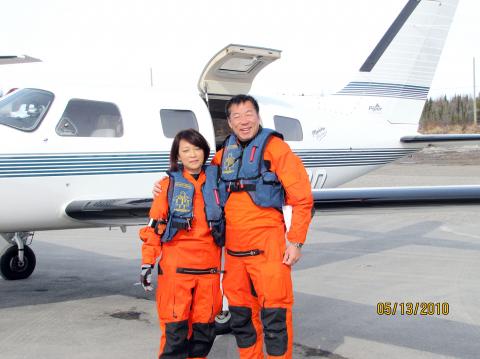The first Taiwanese pilot to circumnavigate the globe in a single-engine airplane died on Friday after the small plane he was flying crashed at San Gabriel Valley Airport in El Monte, California, the Ministry of Foreign Affairs said yesterday.
Jeffrey Ying (應天華), 63, was the first pilot from the US’ Chinese-speaking community to fly around the world in a single-engine airplane in July 2010.
Ying, a Taiwanese expatriate, had been running a fleet of planes with his friends in the US, who also flew the aircraft annually for Double Ten National Day celebration events at Monterey Park in California since 2011, Chinese American Pilots and Aircraft Owners Association director James Bu (卜君力) said.

Photo: CNA
The crashed plane had a Republic of China national emblem painted on the fuselage and was similar to a decommissioned air force trainer aircraft.
The cause of the crash was likely related to mechanical problems, the ministry said, adding that it would provide Ying’s family whatever assistance it needed.
The Los Angeles Times said that Ying’s Pazmany PL-2 took off at about 9:30am, but crashed shortly afterward.
Video broadcast by local TV news outlets from the scene at a corner of the airport showed the aircraft’s nose flattened at an angle and its left wing crumpled.
Ying, who had more than 2,000 hours of flight experience, acquired the PL-2 many years ago, Bu said.
Ying remodeled the plane to look like a Taiwanese trainer and painted the code 5858 himself, Bu said.
In 2010, Ying and his wife, Renee Chen (陳小平), took 82 days to fly 41,843km across 26 countries. Ying became the 166th person to accomplish the endeavor, the Chinese-language United Daily News said.

Tropical Storm Gaemi strengthened into a typhoon at 2pm yesterday, and could make landfall in Yilan County tomorrow, the Central Weather Administration (CWA) said yesterday. The agency was scheduled to issue a sea warning at 11:30pm yesterday, and could issue a land warning later today. Gaemi was moving north-northwest at 4kph, carrying maximum sustained winds near its center of up to 118.8kph and gusts of 154.8kph. The circumference is forecast to reach eastern Taiwan tomorrow morning, with the center making landfall in Yilan County later that night before departing from the north coast, CWA weather forecaster Kuan Shin-ping (官欣平) said yesterday. Uncertainty remains and

SEA WARNING LIKELY: The storm, named Gaemi, could become a moderate typhoon on Wednesday or Thursday, with the Taipei City Government preparing for flooding A tropical depression east of the Philippines developed into a tropical storm named Gaemi at 2pm yesterday, and was moving toward eastern Taiwan, the Central Weather Administration (CWA) said. Gaemi could begin to affect Taiwan proper on Tuesday, lasting until Friday, and could develop into a moderate typhoon on Wednesday or Thursday, it said. A sea warning for Gaemi could be issued as early as Tuesday morning, it added. Gaemi, the third tropical storm in the Pacific Ocean this typhoon season, is projected to begin moving northwest today, and be closest to Taiwan on Wednesday or Thursday, the agency said. Today, there would likely

DISRUPTIONS: The high-speed rail is to operate as normal, while several airlines either canceled flights or announced early departures or late arrivals Schools and offices in 15 cities and counties are to be closed today due to Typhoon Gaemi, local governments announced last night. The 15 are: Taipei, New Taipei City, Taoyuan, Tainan, Keelung, Hsinchu and Kaohsiung, as well as Yilan, Hualien, Hsinchu, Miaoli, Chiayi, Pingtung, Penghu and Lienchiang counties. People should brace for torrential rainfall brought by the storm, with its center forecast to make landfall on the east coast between tonight and tomorrow morning, the Central Weather Administration (CWA) said. The agency issued a sea warning for the typhoon at 11:30pm on Monday, followed by a land warning at 11:30am yesterday. As of

CASUALTY: A 70-year-old woman was killed by a falling tree in Kaohsiung as the premier warned all government agencies to remain on high alert for the next 24 hours Schools and offices nationwide are to be closed for a second day today as Typhoon Gaemi crosses over the nation, bringing torrential rain and whipping winds. Gaemi was forecast to make landfall late last night. From Tuesday night, its outer band brought substantial rainfall and strong winds to the nation. As of 6:15pm last night, the typhoon’s center was 20km southeast of Hualien County, Central Weather Administration (CWA) data showed. It was moving at 19kph and had a radius of 250km. As of 3pm yesterday, one woman had died, while 58 people were injured, the Central Emergency Operation Center said. The 70-year-old